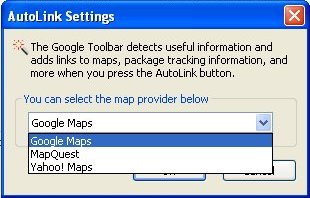That's a hot topic this week, though it's certainly not a new question.Back in 2001 Microsoft introduced then pulled its Smart Tags from the then new version of Microsoft's Internet Explorer browser.Smart Tags essentially gave the browser the power to "add links" to a delivered webpage.The destination? Wherever Microsoft chose! The outcry from the public (for example, The Smart Tags Weblog with the slogan "Coordinating work to keep the Web safe from Microsoft" on which the graphic at left appeared) and those who might lose sales from such a technology caused the company to drop the feature between the beta and final versions of Windows XP.It does still live on in Office XP, but can be turned off.
The issue of such extra tags appearing in HTML reared its head again this week when Google announced its latest toolbar, an optional extension to Internet Explorer.The feature of concern is AutoLink, a button, which, when pushed, scans the page for books' ISBN numbers, addresses, automobile VIN numbers and attaches a link to them.Those links are to Amazon, CarFax and Google Maps, respectively, by default.(As an aside, it's being reported that the fellow who developed Smart Tags for Microsoft is behind Google's AutoLink.) So, the question then is this: Is Google, like Microsoft before it, "hijacking" content? Is it infringing on copyright by altering HTML? Is it misleading the user by misrepresenting the webpage?
 |
Marissa Mayer, Google's director of consumer Web products says no.The difference is that Microsoft added the link automatically.In Google's implementation the user must actively click on the AutoLink button.Further, before being able to even click the button, the user must download and install the add-on.And, if that's not enough, Google offers three options for AutoLink mapping: Google Maps, Yahoo Maps and MapQuest.That seems like "free choice" to me.
Mayer also noted that there are no formal partnerships associated with AutoLink, so no money is heading from Amazon to Google for this feature, for example.The "linkees" were selected for their reputations, she said.Amazon, for example, has the widest selection of books, so they were chosen.In the future, she noted, it should be possible for users to customize their own target links.She points to the "elective" quality of the feature as a way of respecting "copyright and publisher rights."
Terence Ross, an attorney at Gibson Dunn thinks the real issue is one of content ownership."Google does not own the content, and when it uses the content of others to make money, it often will be violating the intellectual property laws." Michael Gartenberg, vice president and research director at Jupiter Research, suggests that subtly doesn't matter since it's the idea that's at issue.The idea was "soundly rejected" in the past, he noted, referring to Microsoft's attempt.
 |
I was challenged recently as to why it is that so many people fear Microsoft but so few question Google.I suggested it's Google's marketing, including its much repeated corporate catch phrase "don't be evil." But really, I don't know.My take on this is quite similar to how I feel about bad TV.If you don't like it, don't watch/use it!